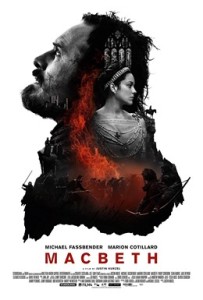19 November 2015
Macbeth
(Director: Justin Kurzel. Certificate: 15)
reviewed by Neil Tidmarsh
Don’t be dismayed by the credits “Screenplay by Todd Louiso, Jacob Koskoff, Michael Lesslie” and “Based on ‘Macbeth’ by William Shakespeare” – this film is authentic Shakespeare through and through.
All the words are Shakespeare’s, even if not all Shakespeare’s words are there. Cuts are inevitable when trimming Shakespeare to fit a film’s 100-odd minutes or so. The director has turned this to his advantage; indeed, reducing the play to its essentials is what his film is all about. This is a concentrated and intense version of the work; scenes like the porter’s, with its comic relief, aren’t necessary and indeed would break the film’s spell. (Though I did miss the great lines “Macbeth hath murdered sleep” and “Hubble bubble toil and trouble” and “Out, out damn’d spot”.)
Details have been added – but these can be justified by the text. The closing scenes show some fine wordless action from Fleance and Malcolm to suggest that violent dynastic struggles for the crown aren’t over but have only just begun – the witches’ cauldron-reflected show of kings beginning to play itself out for real. And the film opens with a funeral – a grieving Macbeth and wife are burying their dead infant, which explains the apparently childless Lady Macbeth’s famously puzzling words “I have given suck, and know How tender ‘tis to love the babe that milks me”. (And a focus on one of the soldiers killed in the first battle suggests that he could be a son of Macbeth’s). Which helps us to feel sympathy for Macbeth, sympathy which is essential for the play to have full tragic impact; but the interesting thing that emerges here is that such extra details are actually unnecessary – Shakespeare’s words are sufficient after all, they build sympathy for his monstrous protagonist by making sure he retains just enough humanity to be aware of the horror of what he’s doing and what he’s becoming. This is very clear when Lady Macbeth cracks and her repressed guilt bursts out in her mad ramblings; the revelatory detail added at the end of her speech is redundant because all her remorse has come through in her words – or should have done. She is nowhere near mad enough here, and I suspect that that added detail (no spoiler here) has inhibited this. The only mis-fire in the film.
But Lady Macbeth’s too-calm madness is my one and only criticism (and even that has been praised by other critics, so you may well disagree with me), because this is a magnificent film. It boils the play down to its essentials and then projects the tone, atmosphere and feel of the residue via two great performances – Michael Fassbender and Marion Cottilard – and a brilliantly chosen and filmed succession of visuals. Shooting outdoors on the Isle of Skye, Australian director Justin Kurzel creates and captures images of fire, blood, mist, smoke, snow, brooding mountains, barren moors, icy seas and rocky shores, all perfectly complementing the play’s bleak and tumultuous drama. The violence and the evil of it come across as raw and unadulterated. The battle scenes are astonishing. The hauntingly appropriate music – by Jed Kurzel, the director’s brother – also deserves a mention.
Justin Kurzel showed great courage (or foolhardiness) stepping into the shoes of Roman Polanski, Akira Kurosawa and Orson Welles, three great directors whose cinematic versions of Macbeth are all masterpieces. But we should be glad that he did, because his version is a masterpiece of Shakespeare cinema in its own right. He can hold his head up high in the company of those three other masters.


